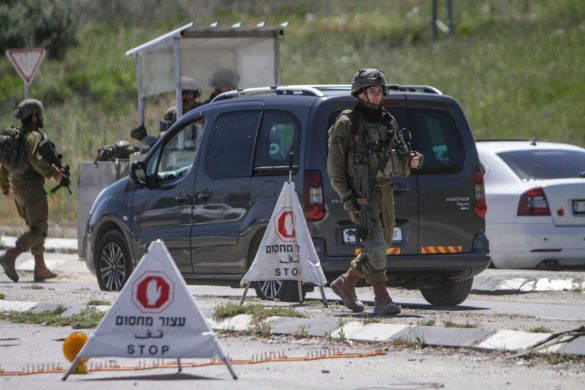Tripoli i det nordlige Libanon har i årtier været præget af voldscyklusser, senest i form af kampe mellem tilhængere og modstandere af den syriske præsident Assad. Men nu er regeringens ny sikkerhedsplan ved at skabe ro i byen.
TRIPOLI, 28 May 2014 (IRIN): Jebel Mohsen has seldom been so quiet. On a Saturday in this district of Lebanon’s northern city of Tripoli, the only sound is that of shovels and pickaxes.
At a demarcation line separating Jebel Mohsen from rival neighbourhood Bab al-Tabbaneh, young people are removing the stains of a 30-year conflict.
Two months ago, no one could walk through this area, known as the Omari Stairs. A barricade was built in the middle of the staircase linking the two neighbourhoods, and a sniper was positioned above.
For Ahmad Bachouri, 29, of Bab al-Tabbaneh, it is the first time he has been able to visit the area – across the frontline – in 10 years.
“Before, I couldn’t come. It was one of the most dangerous parts of this area,” he told IRIN.
“[Now], the war is over. Everything seems to be back to normal today. People don’t have the will to fight any more; they are fed up with violence. I decided to help clean this area to show that we can live together.”
Sectarian tensions
Since the civil war in Lebanon (1975-1990), Tripoli has known several cycles of violence between the Alawi community of Jebel Mohsen and their mostly Sunni neighbours in Bab al-Tabbaneh.
These sectarian tensions had increased as a result of the Syrian conflict next door, but have finally simmered thanks to a new Lebanese government security plan introduced in April.
Syrere og libanesere demonstrerer i Tripoli i marts 2012. Arkivfoto: Freedom House
Tripoli was one of the first places targeted: hundreds of fighters were arrested and the army deployed inside the city.
And as peace returns to Tripoli, civil society is now trying to pick up the pieces and rebuild this fractured town – physically, psychologically and economically.
NGO coalition
The rehabilitation Bachouri is taking part in is called “Erase the Face of the War”, launched by a coalition of local NGOs. It consists of clearing debris and rubble and repainting walls of streets and buildings.
The physical work will take time. The impact of the war is still very visible, with bullet- and sometimes even rocket-holes and the photos of martyrs posted on several buildings.
But above all, the war is imprinted on people’s minds. So the project will not only include street rehabilitation, but also education and cultural activities to bring the two communities back together.
Civil society has tried to encourage reconciliation in the past. In 2010, for example, the NGO Cross Cultures organized a day-long football festival in which children from the rival districts were divided into mixed teams and encouraged to make new friendships.
More recently, the 10 Tripoli-based NGOs decided to come together as a coalition to be better organized and raise more funds.
They started working together after the double bomb attack that hit Tripoli on 23 August 2013, one of the most murderous since the civil war.
Chadi Nachabe, head of Utopia, one of the NGOs of the Coalition, explains:
“Since we worked on the ground after 23 August in Tripoli, citizens have more trust in civil society, because we’re not theoretical. We’ve been on the ground for many months with them to rehabilitate.”
“We are very weak”
Still, Nachabe does not hide the fact that civil society needs help:
“I think we’re still very weak because we need a clear plan and strategy. There are a lot of NGOs in Tripoli, but 90 percent of them are linked to politicians.”
Recently, NGOs have started to work with the municipality. “Erase the Face of the War”, for example, is coordinated by both the NGOs and the municipality.
“The NGOs in Tripoli are very hard-working. But they’re not always well organized,” explains Mohammad Chamsin, a municipal councillor.
“They need a mediator to organize between them, so that they don’t work on the same projects.”
Jobs and education
Læs videre på
http://www.irinnews.org/report/100145/lebanon-s-fractured-city-of-tripoli-starts-to-rebuild-after-tentative-peace














